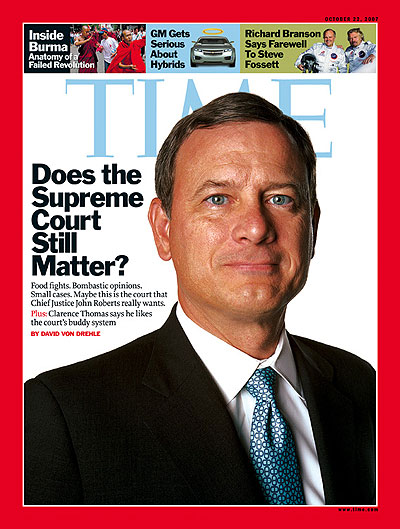Sometimes when I write things slightly out of my wheelhouse I get a bit concerned about mucking things up and making a fool of myself. This is especially true if I’m writing about the United States Supreme Court and noting something that others didn’t feel worthy of comment.
And today I got confirmation about whether I made myself a fool. I didn’t. And not only didn’t I muck it up, but New York Times columnist and Supreme Court diva Linda Greenhouse agrees with me. Whew.
Last week I noted a statement by Chief Justice John Roberts in the matter of Marek v. Lane, which was a class action settlement involving Facebook. Instead of settlement money going to Facebook users, it went into a new fund dedicated to educating people about privacy on the Internet. These are known as cy pres settlements, meaning that due to the problems of distributing funds, this arrangement is “as near as possible” to doing just that. That is the theory.
My point was that C.J. Roberts was being rather activist in his statement, as the questions he asked about these types of settlements are those best addressed by a legislature. Roberts, however, was asking litigants to bring him a case so that the court could address the issues that he identified.
And today Linda Greenhouse hits just that point, in a piece entitled “Bring Me A Case,” linking together several unrelated matters where various federal judges have all said, bring me a case.
With regards to Marek v. Lane, Greenhouse writes:
While this particular appeal presented too narrow a slice of the “more fundamental concerns” about this increasingly popular kind of settlement, the chief justice said, “in a suitable case, the court may need to clarify the limits on the use of such remedies.” Citing a law review article that criticized such settlements as among the “pathologies of the modern class action,” he posed six questions, ending with “and so on,” which implied that there was quite a bit more that he wanted to know.
Judicial activism can take many forms, and one way is to call for a particular kind of case in order to “feed the docket,” which I’m pretty sure is not what Roberts had in mind when he testified at his confirmation hearing that the justices were merely umpires in disputes — that they are there “to call balls and strikes and not to pitch or bat.”
As Greenhouse then writes:
[N]o one is accusing Chief Justice Roberts of any kind of ethical violation in issuing his invitation to bring the Supreme Court another challenge to the newfangled species of class-action settlement that he finds troubling. Nor am I suggesting that his statement was in any way improper. But it sheds light on an underappreciated aspect of the court’s institutional behavior, on what one might call the care and feeding of the docket.
…
The court is an active participant in shaping its own destiny through a continuing dialogue with a legal system attuned to its every nuance and primed to respond accordingly. The court’s role in this respect might be seen as closer to legislative than judicial; one federal judge I spoke with this week said the chief justice, with his list of questions about class-action remedies, sounded like the chairman of the Senate Judiciary Committee convening a hearing. (emphasis added)
Now I’m not so horribly vain as to think my little posting about this last week caught Greenhouse’s attention, even though I wrote language almost identical to her theme:
This call to action (‘Send me a good case so we can put our imprimatur on the issue!’), goes quite a ways away from merely umpiring for the people on different sides of an issue.
The fact is, my blog wasn’t mentioned anywhere, nor linked to, nor was the post even tweeted about. I simply published it and it died on the spot.
But I’m gratified to see that the issue is now front and center. The idea that Roberts espoused, that he is there merely as an umpire, is belied by his call for a case and the legislative-like questions that he both asked and wanted to answer in a subsequent opinion.

